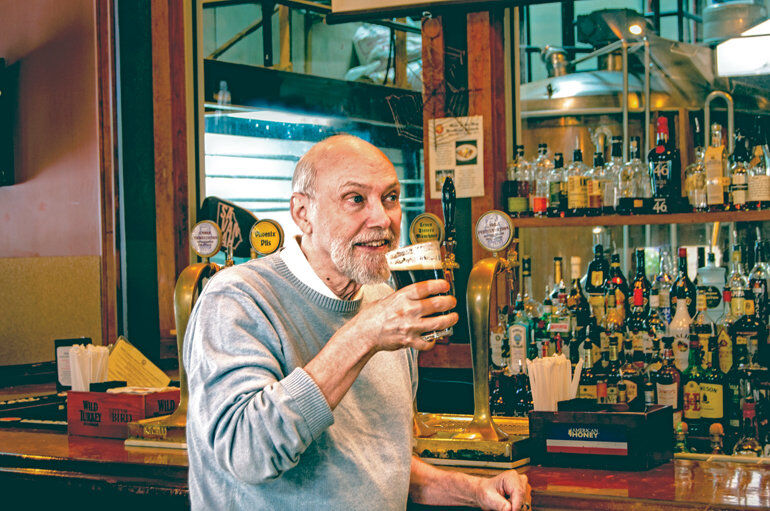Start 14-Day Trial Subscription
*No credit card required

Is ‘Co-opetition’ At The Core Of Craft Beer’s Future?
I first heard the word that is a hybrid of cooperation and competition during the broadcast of a NASCAR race. Announcer Darrell Waltrip described what was happening in the high-speed draft at Daytona as “co-opetition.” Drivers cooperated with each other to get to the front of the field, he said, then tried to beat each other for the victory at the finish.
Hardly confined to NASCAR, the word co-opetition has been bandied about by business writers for the last two decades because the nature of some business has radically changed. A typical example of change is the shorter life span of tech products, which has put pressure on companies to engage in co-opetition – reducing product development costs by sharing knowledge with companies in the same field while simultaneously trying to beat each other in the marketplace.
But wait. This is a beer magazine. The alert reader has probably already recognized collaboration is second nature in the world of craft brewing. Is collaboration the same as co-opetition?
A recent blog post that emanated from the North Carolina Craft Brewer’s Conference was the first full discussion I’ve seen on the subject of co-opetition in craft brewing. The blog I read at RadCraftBeer revolved around the shared values among independent craft brewers such as hugging one’s competitors in place of “keeping your friends close and your enemies closer.”
To me, the hugging is more about cooperation and valuing the competition of your fellow brewers – as in a rising tide lifts all boats. As so often is the case in discussions about craft brewing, the emphasis is on shared values, cooperation, knowledge-sharing and commitment to community. But are those shared values the same as tech companies sharing knowledge about product development and then competing against one another for product sales in the marketplace? Are the shared values of craft breweries the same as competing car companies using the same, or shared, parts to build their cars before competing for sales in the marketplace?
If the answer is yes, then all craft brewing is a matter of co-opetition – shared values on how brewers operate their businesses, and then competing tooth and nail in the marketplace.
Even without mentoring or direct involvement from existing brewers, new brewers tap into the zeitgeist of craft brewing’s shared values. This process is working well enough that 85 percent of all Americans now live within 10 miles of a brewery, according to the Brewers Association.
To me, this sheds light on the response when a craft brewer sells a percentage of its stock to a private equity company or a macro brewer. It’s sometimes perceived as an act of betrayal, because supposedly shared values have been abandoned. On the other hand, brewers who would raise capital to improve their ability to compete in the marketplace may only be guilty of… co-opetition.
The most recent example of this dynamic was the sale of 30 percent of its stock by Avery Brewing Company to Mahou San Miguel, the Spanish macro brewer. Some folks in the Colorado area and elsewhere responded as if they had a traitor in their midst. A similar purchase by the same Spanish macro of 30 percent of Founders Brewing Company in 2014, interestingly, didn’t seem to raise as many eyebrows. And since then, Founders has continued to be an American success story in terms of growth and excellent beer. Plus, there appears to not have been any significant change in the values that drive Founders, still majority owned by co-founders Mike Stevens and Dave Engbers.
Avery, like Founders, will no longer be considered a craft brewer by the BA, because of the organization’s limit on 25 percent ownership from a macro brewer. To me, that seems as arbitrary as allowing a brewery to sell any amount of stock to a private equity company and still remain a member of the BA in good standing.
Also on this same list that strikes me as arbitrary is the insistence by some craft brewers that their fellow brewers retain their independent standing by pursuing financing through loans or deals with financial institutions – and ignore other options. The idea behind this point of view is to protect craft and its values. (But even Employee Stock Ownership Plans, which are funded through banks, don’t insure against a sale to private equity if the employees vote to accept an offer.)
In my view, sales such as those by Avery or Founders exemplify very real co-opetition, i.e. the idea of gaining a larger share of the market by a change in one’s capital structure without necessarily casting aside the shared values of craft.
A few years ago, I remember talking to Jim Koch of Boston Beer Co. about what he described as “this cathedral of craft beer.” (The phrase came up during a discussion about the mid-1980s when a healthy independent brewing segment, much less a good American IPA, didn’t exist.) In this case, I envisioned a building constructed of individual stones. Those stones in the cathedral now number more than 6,000 when it comes to counting craft breweries in America.
All those breweries are competing tooth-and-nail to get a share of the marketplace, and, in fact, stalwart Boston Beer Co. has recently been losing market share as a result. In a co-opetition model, that’s the deal. You may share the same starting point, but market share is subject to standard sales dynamics that are largely dependent upon the finished product – in this case, the beer.
For real co-opetition to take place, there has to be a risk of being beat on the sales side after the sharing side is fulfilled, the risk that craft leader Boston Beer is now experiencing.
For its part, Avery runs the risk of giving up its membership in the BA and the perception of being a craft brewer in favor of financial security and partnering that is counted on to benefit its ability to maintain or pursue a larger market share – just as Founders before it.
The recent spate of the sale of stock to private equity poses the risk that future business may not be pursued according to the fundamental values of craft – with resultant suffering in the marketplace.
The risk of trying to grow market share versus your fellow craft brewers though expanding by bank loans has the inherent risk of becoming over-extended – as recent closings and bankruptcies indicate.
In other words, craft brewers looking to grow are choosing different routes of co-opetition when it comes to raising capital.
The one option that is not co-opetition is obvious. The elephant in the room is the sale of 100 percent of stock by a craft brewer to a macro brewery, which introduces an element of co-option instead of co-opetition. AB InBev’s most recent announcement about how its High End – or the group of acquired breweries – will be managed, for example, is basically craft brewing values converted into a well-funded marketing plan.
The political fear is that craft brewers willing to sell percentages of their company, or all of their stock, to a macro brewer will eventually bring down the craft beer movement and send it back to the days of yesteryear when a good American IPA didn’t exist.
Is that a legitimate fear? It’s a cause for alarm if large entities try to disrupt a fully functioning system of co-opetition by purchasing the system’s core values and then claiming them as their own. But it seems to me the current cathedral known as craft is not vulnerable to crashing down when the number of breweries continues to expand dramatically along with the volumes being produced by some of these new breweries. And, it’s fully legitimate if craft breweries, in pursuit of a larger market share, sell percentages of their stock to other breweries or private equity, because it does not necessarily mean giving up craft values.



